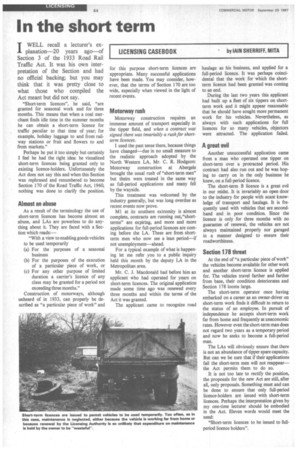In the short term
Page 46

If you've noticed an error in this article please click here to report it so we can fix it.
LICENSING CASEBOOK by IAIN SHERRIFF, MITA T WELL recall a lecturer's ex
”planation-20 years ago of Section 3 of the 1933 Road Rail Traffic Act. It was his own interpretation of the Section and had no official backing; but you may think that it was pretty close to what those who compiled the Act meant but did not say.
"Short-term licences", he said, "are granted for seasonal work and for three months. This means that when a coal merchant finds idle time in the summer months he can obtain a short-term licence for traffic peculiar to that time of year; for example, holiday luggage to and from railway stations or fruit and flowers to and from markets."
Perhaps he put it too simply but certainly I feel he had the right idea: he visualized short-term licences being granted only to existing licence-holders. Unfortunately the Act does not say this and when this Section was rephrased and renumbered to become Section 170 of the Road Traffic Act, 1960, nothing was done to clarify the position.
Almost an abuse As a result of the terminology the use of short-term licences has become almost an abuse, and LAs are powerless to do anything about it. They are faced with a Section which reads:—
"With a view to enabling goods vehicles to be used temporarily (a) For the purposes of a seasonal business (b) For the purposes of the execution of a particular piece of work, or (c) For any other purpose of limited duration a carrier's licence of any class may be granted for a period not exceeding three months." Construction of motorways, although unheard of in 1933, can properly be described as "a particular piece of work" and for this purpose short-term licences are appropriate. Many successful applications have been made. You may consider, however, that the terms of Section 170 are too wide, especially when viewed in the light of recent events.
Motorway rush
Motorway construction requires an immense amount of transport especially in the tipper field, and when a contract was signed there was invariably a rush for shortterm licences.
I used the past tense there, because things have changed—due in no small measure to the realistic approach adopted by the North Western LA, Mr. C. R. Hodgson: Motorway construction at Abergele brought the usual rush of "short-term men" but theirs were treated in the same way as full-period applications and many fell by the wayside.
This treatment was welcomed by the industry generally, but was long overdue as recent events now prove.
MI at its southern extremity is almost complete, contracts are running out,"shortterms" are expiring, and more and more applications for full-period licences are coming before the LA. These are from shortterm men who now see a lean period—if not unemployment—ahead.
For a typical example of what is happening let me refer you to a public inquiry held this month by the deputy LA in the Metropolitan area.
Mr. C. J. Macdonald had before him an applicant who had operated for years on short-term licences. The original application made some time ago was renewed every three months and within the terms of the Act it was granted.
The applicant came to recognize road haulage as his business, and applied for a full-period licence. It was perhaps coincidental that the work for which the shortterm licence had been granted was coming to an end.
During the last two years this applicant had built up a fleet of six tippers on shortterm work and it might appear reasonable that he should have sought more permanent work for his vehicles. Nevertheless, as always with such applications for full licences for so many vehicles, objectors were attracted. The application failed.
A great evil
Another unsuccessful application came from a man who operated one tipper on short-term over a protracted period. His contract had also run out and he was hoping to carry on in the only business he knew, on a full-period licence.
The short-term 13 licence is a great evil in our midst. It is invariably an open door to the industry for people with scant knowledge of transport and haulage. It is frequently used with vehicles that are secondhand and in poor condition. Since the licence is only for three months with no guarantee of renewal, the vehicles are not always maintained properly nor garaged in a manner designed to ensure their roadworthiness.
Section 178 threat
At the end of "a particular piece of work" the vehicles become available for other work and another short-term licence is applied for. The vehicles travel farther and farther from base, their condition deteriorates and Section 178 looms large.
The short-term operator once having embarked on a career as an owner-driver on short-term work finds it difficult to return to the status of an employee. In pursuit of independence he accepts short-term work far from home and frequently at uneconomic rates. However even the short-term man does not regard two years as a temporary period and now he seeks to become a full-period man.
The LAs will obviously ensure that there is not an abundance of tipper spare capacity. But can we be sure that if their applications fail the short-term men will not reappear— the Act permits them to do so.
It is not too late to rectify the position, the proposals for the new Act are still, after all, only proposals. Something must and can be done to ensure that only full-period licence-holders are issued with short-term licences. Perhaps the interpretation given by my one-time lecturer should be embodied in the Act. Eleven words would meet the need: "Short-term licences to be issued to fullperiod licence holders".




































































































































































